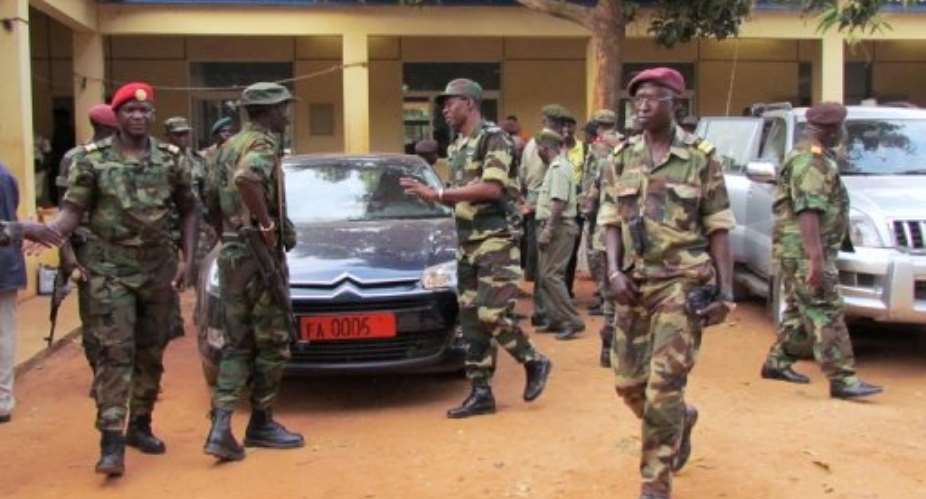BISSAU (AFP) - Guinea-Bissau's former ruling party on Wednesday rejected the junta's plans for a transition government and demanded the release of top political leaders being held by the military rulers.
Despite the threat of sanctions from the African Union which on Tuesday suspended the country, the junta has refused to release political prisoners and has threatened "severe repression" against any demonstration or march.
The soldiers who seized power on April 12 in the latest coup in the chronically unstable west African nation, are holding former premier Carlos Gomes, interim president Raimundo Pereira and several former ministers.
Arrests continued Wednesday as former secretary of state Fode Cassama was seized at his house by soldiers and taken to an unknown destination, his family told AFP.
It is still not clear how many people are being held, and while a team from the Red Cross was able to take medicine to Gomes, a diabetic, on Saturday, no one has seen Pereira since the coup.
"We haven't seen him, but we would like to see him," said a Red Cross spokesman in Dakar, Denes Benzedi, adding they were in dialogue with the junta to get further access to the prisoners.
The capital Bissau remained quiet as many left for the interior after the coup fearing further violence. Banks were closed and petrol and money was running low.
Luis Olivares, secretary general of the African Party for the Independence of Guinea and Cape Verde (PAIGC) demanded that "all dissolved institutions be re-established" and that a planned second round election on April 29 go ahead.
"For the PAIGC, the return to constitutional normality means that the interim president and prime minister return to their posts," he told AFP.
"The National Transition Council is anti-democratic and anti-constitutional. The PAIGC rejects all solutions proposed outside of the constitution."
He also called for the United Nations to send a "stabilisation force" to the country, whose army and state have been in constant competition since independence, leading to coups, counter-coups and assassinations.
The most recent coup came in the middle of an election billed as a test of the country's commitment to stability seen as key to dealing with a booming cocaine trade to Europe.
Gomes stepped down as prime minister to take part in the polls after the death in January of president Malam Bacai Sanha, and won a first round which opposition candidates denounced as fraudulent and declared a boycott.
Peter Thompson, the head of the UK election observer mission is stranded in the country whose borders have been closed since the coup and said the overthrew is a blow to the country's bid for stability.
"Clearly it is a great shame for both the people of Guinea-Bissau and the international community that the democratic process has been undermined so forcefully," said Thompson, who also leads a parlimentary group on Guinea-Bissau.
Fifty percent of cocaine trafficked into the UK comes from west Africa and the country had been heavily involved with rustling up investment and working on stability issues in the country in recent months to stem the drug flow.
Despite international calls for the run-off to go ahead, the army dissolved all existing institutions and declared a National Transitional Council together with opposition parties.
The junta agreed in a meeting with a delegation from the Economic Community of West African States (ECOWAS) to restore civilian rule, but on Tuesday warned that any protests would face "severe repression."
Junta spokesman Daba Na Walna told journalists for AFP and Radio France Internationale that Gomes and Pereira would only be freed "when security conditions are right".
On Tuesday AU Peace and Security Council chief Ramtane Lamamra urged the AU commission -- the bloc's executive body -- and ECOWAS to consider imposing sanctions on the coup leaders.
The putschists justified their power grab by claiming there had been a "secret deal" with Angola to undermine the army.
Oil-rich Angola which has provided a lot of money in investment in the country, last year sent 200 troops to Guinea-Bissau to help reform the army.





 Saglemi Housing Project will not be left to rot – Kojo Oppong Nkrumah
Saglemi Housing Project will not be left to rot – Kojo Oppong Nkrumah
 Transport fares hike: GPRTU issue two-day ultimatum
Transport fares hike: GPRTU issue two-day ultimatum
 ARC endorses Alan as presidential candidate – Buaben Asamoa
ARC endorses Alan as presidential candidate – Buaben Asamoa
 Akufo-Addo appoints Kwasi Agyei as new Controller and Accountant-General
Akufo-Addo appoints Kwasi Agyei as new Controller and Accountant-General
 PNC dismiss reports of mass resignations
PNC dismiss reports of mass resignations
 PAC advocates for revenue collectors to be engaged on commission basis, not full...
PAC advocates for revenue collectors to be engaged on commission basis, not full...
 Genser Energy commissions 110km of natural gas pipeline at Anwomaso
Genser Energy commissions 110km of natural gas pipeline at Anwomaso
 Naa Torshie calls for tolerance, peace ahead of 2024 election
Naa Torshie calls for tolerance, peace ahead of 2024 election
 Asantehene commends Matthew Opoku Prempeh for conceiving GENSER Kumasi Pipeline ...
Asantehene commends Matthew Opoku Prempeh for conceiving GENSER Kumasi Pipeline ...
 Let’s do away with ‘slash and burn politics’ in Ghana — Dr Adutwum
Let’s do away with ‘slash and burn politics’ in Ghana — Dr Adutwum
